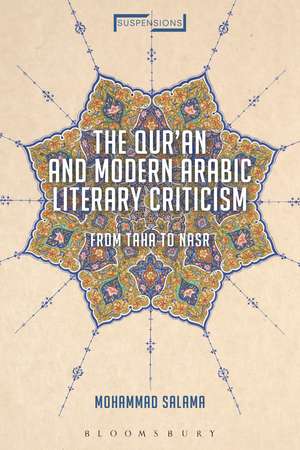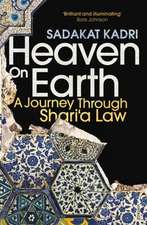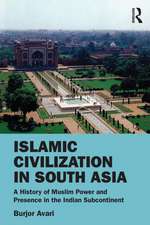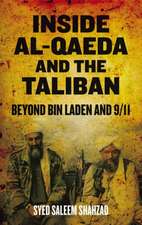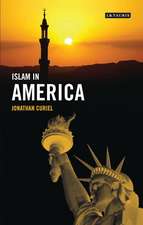The Qur'an and Modern Arabic Literary Criticism: From Taha to Nasr: Suspensions: Contemporary Middle Eastern and Islamicate Thought
Autor Mohammad Salamaen Limba Engleză Paperback – 27 noi 2019
| Toate formatele și edițiile | Preț | Express |
|---|---|---|
| Paperback (1) | 229.05 lei 6-8 săpt. | |
| Bloomsbury Publishing – 27 noi 2019 | 229.05 lei 6-8 săpt. | |
| Hardback (1) | 713.61 lei 6-8 săpt. | |
| Bloomsbury Publishing – 16 mai 2018 | 713.61 lei 6-8 săpt. |
Din seria Suspensions: Contemporary Middle Eastern and Islamicate Thought
- 28%
 Preț: 405.76 lei
Preț: 405.76 lei - 22%
 Preț: 237.28 lei
Preț: 237.28 lei - 23%
 Preț: 172.99 lei
Preț: 172.99 lei - 12%
 Preț: 216.16 lei
Preț: 216.16 lei - 30%
 Preț: 567.99 lei
Preț: 567.99 lei - 22%
 Preț: 256.20 lei
Preț: 256.20 lei - 13%
 Preț: 257.50 lei
Preț: 257.50 lei - 22%
 Preț: 256.85 lei
Preț: 256.85 lei - 23%
 Preț: 171.39 lei
Preț: 171.39 lei - 13%
 Preț: 257.50 lei
Preț: 257.50 lei - 13%
 Preț: 238.76 lei
Preț: 238.76 lei - 13%
 Preț: 257.97 lei
Preț: 257.97 lei - 22%
 Preț: 231.81 lei
Preț: 231.81 lei - 22%
 Preț: 224.21 lei
Preț: 224.21 lei - 23%
 Preț: 198.12 lei
Preț: 198.12 lei - 23%
 Preț: 198.68 lei
Preț: 198.68 lei - 24%
 Preț: 188.82 lei
Preț: 188.82 lei
Preț: 229.05 lei
Preț vechi: 264.15 lei
-13% Nou
Puncte Express: 344
Preț estimativ în valută:
43.83€ • 45.88$ • 36.27£
43.83€ • 45.88$ • 36.27£
Carte tipărită la comandă
Livrare economică 05-19 aprilie
Preluare comenzi: 021 569.72.76
Specificații
ISBN-13: 9781350141599
ISBN-10: 1350141593
Pagini: 176
Dimensiuni: 156 x 234 mm
Greutate: 0.26 kg
Editura: Bloomsbury Publishing
Colecția Bloomsbury Academic
Seria Suspensions: Contemporary Middle Eastern and Islamicate Thought
Locul publicării:London, United Kingdom
ISBN-10: 1350141593
Pagini: 176
Dimensiuni: 156 x 234 mm
Greutate: 0.26 kg
Editura: Bloomsbury Publishing
Colecția Bloomsbury Academic
Seria Suspensions: Contemporary Middle Eastern and Islamicate Thought
Locul publicării:London, United Kingdom
Caracteristici
Offers a new theory for thinking through the relationship between sacred text, religious ideas, poetics, literary innovation and counter-currents within contemporary Egyptian culture
Notă biografică
Mohammad Salama is Professor of Arabic and Chair of the Department of Modern Languages and Literatures, San Francisco State University, USA. He is the author of Islam and the Culture of Modern Egypt (2018) and Islam, Orientalism and Intellectual History (2011).
Cuprins
Series ForewordAcknowledgementsA Note on Transliteration and TranslationIntroduction1. A Cartesian Backfire? Taha Husayn, The Qur'an, and the Cogito2. The Return to Philology and the Unmasking of Traditionalism in Amin al- Khuli3. Muhammad Ahmad Khalafallah: The Art of Narrative in the Qur'an4. Bint al-Shati: Literary Significations in the Qur'an 5. Reclaiming Qur'anic Exegesis: Nasr Hamid Abu Zayd between Traditionalism and Postsecularism6. On Metaphor: Abu Zayd and the Ideologies of majaz in the Qur'anConclusionBibliographyIndex
Recenzii
This book is an asset for graduate-level teaching and scholarship for those interested in Arabic literary criticism and critical developments in twentieth-century Qur'anic exegesis. With its superb attention to conceptual nuance, Salama offers a thorough analysis of an important locale and historical moment in Islamic intellectual history.
This is one of the best studies to appear on the central debate in modern Islam: How should Muslims study the Qur'an? Previous scholarship has approached this question from a theological angle. The fact is that the study of the Qur'an in modern Islam was intimately tied to a debate about literature and the formation of an Arabic literary canon. Salama's study is a brilliant analysis of the literary battles over the nature of the Qur'an and its place in relationship to a literary canon. This is a must read and will change how we understand the very nature of modern Qur'an commentary.
Mohammad Salama tells the story of five giants of 20th century Egyptian scholarship who have gone against the mainstream in their inquiries into the Quran. Interestingly, it is through philology that they forge a path of rationalism, challenging essentialisms whether in the form of Islamic fundamentalism or Western Orientalism. Salama reminds us of these voices of reason with a sense of urgency in an era where it seems ever more difficult to hear them.
Salama's new book is a perceptive and sophisticated overview of the approaches to the Qur'an by the major, albeit controversial, lights of modern literary criticism in twentieth-century Egypt. More than just another dry academic study, it is a passionate, if occasionally polemical call to appreciate the Qur'an as an eminently rich and linguistically challenging literary masterpiece that bridges the seemingly unbridgeable gap between unfathomable transcendent realities and a limited, and often faulty, human understanding of their true implications. The book also features an ardent and eloquent plea, simultaneously, for emancipating and de-colonizing the study of Islam's foundational text at a time of the severe intellectual and geopolitical crises faced by the Muslims the world over.
Through a close examination of the oeuvre of five influential authors who left an astounding input on the study of the Qur'an in relation to literature and literary criticism, the study at hand delves into the major textual, philological, intellectual, and political currents and Islamic discourses in twentieth century Egypt. The book is an important addition that fills a lacuna in 20th-century Arabic and Islamic thought.
"Knowing, subtle, and clear, Mohammad Salama makes powerful and passionate arguments for the relevance and importance of twentieth-century Egyptian philology. He recaptures, recuperates, and critically engages with theories of language and the Quran in the work of four major scholars. He writes an argument against twenty-first-century essentialism that applies across politics, theology, and academia.
Salama's timely book analyzes the debate over the interpretation of the Qur'an through the lens of literary criticism, focusing on iconic renovators in twentieth-century Egypt. The historical contexts and the rhetorical strategies past and present are called on to situate the shift in Qur'anic scholarship that four men and a woman contributed to. It is a study that is indispensable not only for Islamic studies but for the intellectual history of modern Egypt.
This is one of the best studies to appear on the central debate in modern Islam: How should Muslims study the Qur'an? Previous scholarship has approached this question from a theological angle. The fact is that the study of the Qur'an in modern Islam was intimately tied to a debate about literature and the formation of an Arabic literary canon. Salama's study is a brilliant analysis of the literary battles over the nature of the Qur'an and its place in relationship to a literary canon. This is a must read and will change how we understand the very nature of modern Qur'an commentary.
Mohammad Salama tells the story of five giants of 20th century Egyptian scholarship who have gone against the mainstream in their inquiries into the Quran. Interestingly, it is through philology that they forge a path of rationalism, challenging essentialisms whether in the form of Islamic fundamentalism or Western Orientalism. Salama reminds us of these voices of reason with a sense of urgency in an era where it seems ever more difficult to hear them.
Salama's new book is a perceptive and sophisticated overview of the approaches to the Qur'an by the major, albeit controversial, lights of modern literary criticism in twentieth-century Egypt. More than just another dry academic study, it is a passionate, if occasionally polemical call to appreciate the Qur'an as an eminently rich and linguistically challenging literary masterpiece that bridges the seemingly unbridgeable gap between unfathomable transcendent realities and a limited, and often faulty, human understanding of their true implications. The book also features an ardent and eloquent plea, simultaneously, for emancipating and de-colonizing the study of Islam's foundational text at a time of the severe intellectual and geopolitical crises faced by the Muslims the world over.
Through a close examination of the oeuvre of five influential authors who left an astounding input on the study of the Qur'an in relation to literature and literary criticism, the study at hand delves into the major textual, philological, intellectual, and political currents and Islamic discourses in twentieth century Egypt. The book is an important addition that fills a lacuna in 20th-century Arabic and Islamic thought.
"Knowing, subtle, and clear, Mohammad Salama makes powerful and passionate arguments for the relevance and importance of twentieth-century Egyptian philology. He recaptures, recuperates, and critically engages with theories of language and the Quran in the work of four major scholars. He writes an argument against twenty-first-century essentialism that applies across politics, theology, and academia.
Salama's timely book analyzes the debate over the interpretation of the Qur'an through the lens of literary criticism, focusing on iconic renovators in twentieth-century Egypt. The historical contexts and the rhetorical strategies past and present are called on to situate the shift in Qur'anic scholarship that four men and a woman contributed to. It is a study that is indispensable not only for Islamic studies but for the intellectual history of modern Egypt.
